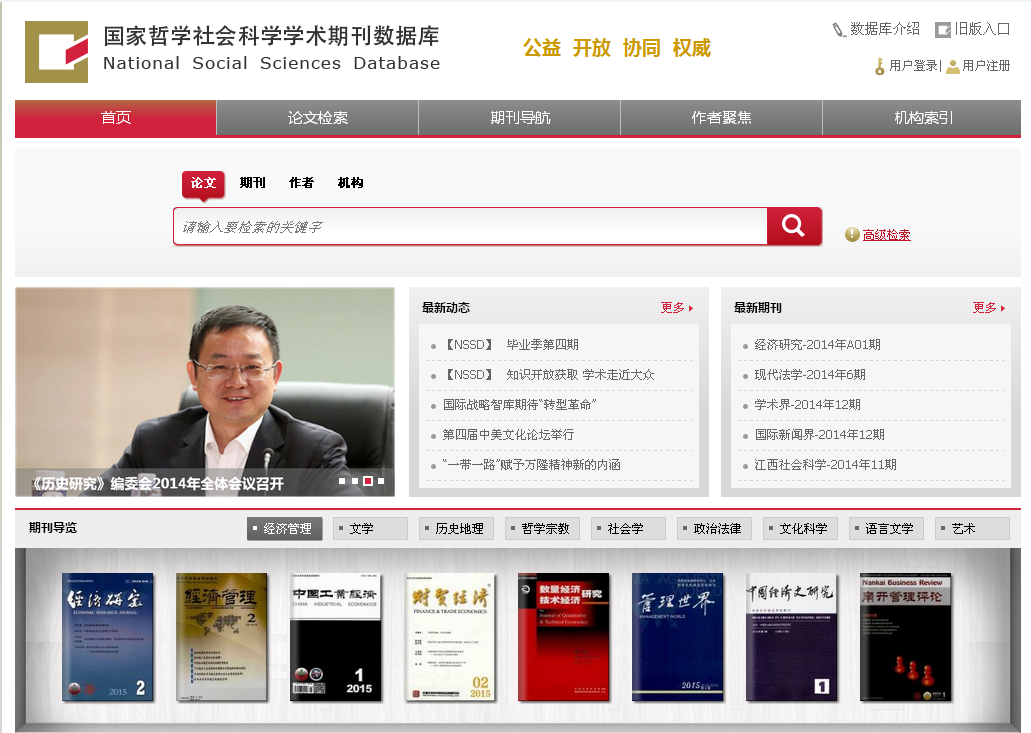Social science database more accessible

On March 28, the National Social Sciences Database (NSSD) operated by the Chinese Academy of Social Sciences (CASS) integrated with NoteExpress, a bibliographic search and management software, enabling millions of users from more than 200 colleges and universities to search the database.
"NoteExpress promotes resource sharing among different databases, which serves the goal of 'providing the public with open access to knowledge'. Users of the software will now have access to the vast amount of free academic resources available in the NSSD, " said a project administrator.
Promoting academic sharing
Since its launch in July 2013, the NSSD has been committed to becoming an open, coordinated and authoritative platform for the public good and has continued to upgrade its functions.
More and more experts and scholars in China and abroad are recognizing the potential of the NSSD.
“It is an amazing project that may break the monopoly in the field of e-journal publishing, laying a solid foundation for the integration of the elite Chinese journals on social sciences into worldwide open access,” said Xu Ye, a research librarian from the Memorial Library at the University of Wisconsin-Madison.
Xiao Long, deputy curator of the Peking University Library, said that the NSSD follows the global trend of open access, and the PKU will participate in and support it.
Also, the NSSD provides a window into academic achievements for all the people who are interested in academic research.
Development, cooperation
After twice expanding its capacity and upgrading its system, the NSSD has improved its functions in all aspects and surpassed HighWire Press affiliated with Stanford University to be the largest open periodical database in the world.
It has signed agreements with 648 publishers, of which 471 have been listed as core journals by CASS, Nanjing University and Peking University, including Qiushi published by the CPC Central Committee.
At present, the NSSD includes 639 journals and more than 2.8 million papers, of which 401 journals have complete catalogues dating back to the year they were first published. As many as 65 journals, such as Historical Research, include issues from the years before 1960, and 68 journals are being published online in synchronization with their printed editions.
Equipped with various means of navigation and retrieval, the NSSD provides basic services such as periodical browsing, search, online reading and full-text downloading. In addition, it has specialized functions, such as statistical analysis of retrieval results, journal evaluation and author introduction and comment.
The NSSD has improved its personalized functions, allowing users to collect, subscribe and share the journals and papers they like. Also, the NSSD has implemented online and offline synchronization as well as a section on the latest journals.
To better share academic resources, the NSSD is actively seeking nonprofit cooperation with other online platforms. It aggregates its periodical metadata into the Primo Central Index with the most users under the Ex Libris Group, a leading provider of library automation software. It also integrates its periodical metadata into the database of the China Academic Social Sciences and Humanities Library. It has launched an academic channel together with Guang Ming online, one of the key central news websites in China.
Gaining popularity
Though there has been little publicity about the database, the NSSD is quickly becoming a household name as it expands its data capacity and improves the functions of the system.
At present, the NSSD has been listed as a recommended database by 265 domestic and overseas institutions, including the National Library of China, the Capital Library of China, the US Library of Congress and the Yale University Library.
According to statistics, the NSSD has more than 50,000 personal users and 16 institutional users, and it averages 300,000 hits per day. More than 1.6 million papers have been downloaded. A lot of workers and lovers of social sciences from higher education, scientific research institutions and all other walks of life have become regular users of the NSSD.
“The homepage is clear, and the search box is simple but multifunctional,” said Sun Baoxue from the School of Philosophy and Social Development, Shandong University. A netizen from Guangxi Province commented, “The main merit is that it excludes low-quality journals, which guarantees the academic and professional level of the documents.”
The NSSD has also taken advantage of new media like microblogs, Wechat and QQ.
In the future, the NSSD will emphasize the exploration of digital publication, human-computer interaction and customized services to improve the secondary development of academic resources and establish a professional database at the leading edge.
At the same time, it will strive to cater to the cultural demands of the public and promote the spread of excellent achievements of philosophy and social sciences among the public. Furthermore, it is necessary to set up a public service system in the academic world so that everyone will be given access to public cultural services.
Deng Zhimei is a reporter the Chinese Social Sciences Today.
